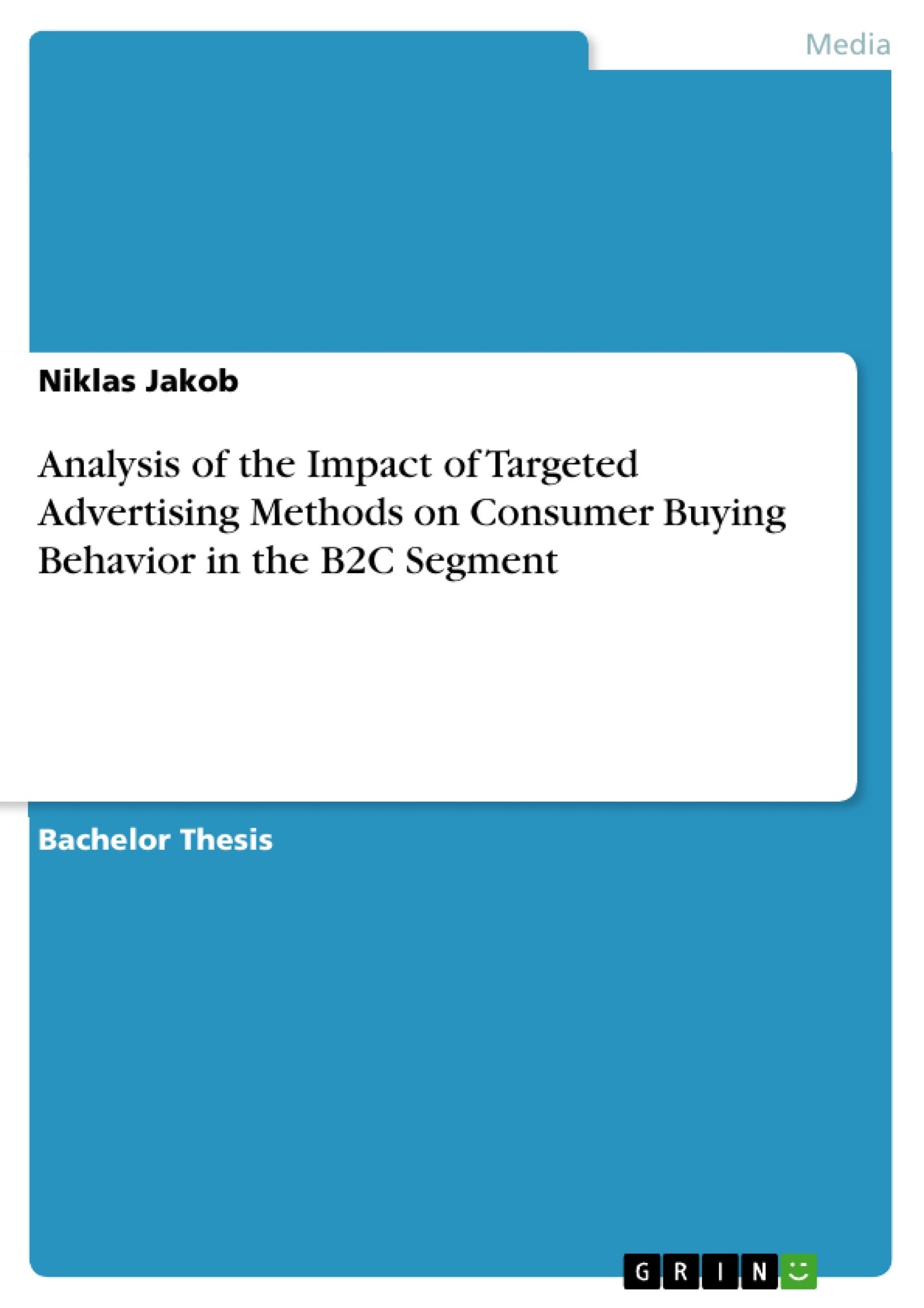Targeted advertising methods are essential tools for marketers who aim to tailor their marketing communication to specific target groups. The impact of such targeting methods on consumer buying behavior, however, is contentious, as data privacy concerns on behalf of the consumers threaten to impair the effectiveness of targeted advertisements. Against this background, this thesis investigates how targeted advertising methods affect online buying behavior in the B2C segment. In this context, the thesis particularly examines technical targeting methods, as the comprehensive review of literature and prior research revealed a research gap in this field.
To answer the research question and test the associated hypotheses, the thesis resorted to an online survey, encompassing two questionnaires distributed to German- and English-speaking sample groups. The quantitative data obtained through this online survey was subsequently analyzed using statistical methods such as descriptive statistics, group statistics, correlations, and T-Tests. Eventually, the findings gained from this procedure enabled the derivation of theoretical contributions to the field of strategic marketing and practical recommendations for B2C companies.
Targeted advertising has evolved into a significant part of the global advertising ecosystem, making it feasible to target consumers based on an analysis of data gathered online. The appeal of targeted advertising is anchored in the ability to provide consumers with a tailor-made advertising experience.
According to German economist Bernd W. Wirtz, targeted advertising methods are essential elements in the targeting process, as these methods enhance the effectiveness and efficiency by which target consumers can be addressed. Consequently, Wirtz identifies the selection of appropriate targeting methods to be critical to the communication success of companies. A study conducted by IHS Markit validates the claim of Wirtz that targeted advertising methods have a positive impact on advertising effectiveness, indicating that specific targeting methods achieve click-through rates [CTR] that are up to 5.3 times higher than the CTR of non-targeted advertising formats. In light of the elevated propensity of consumers to click on a targeted advertisement, Michael Bailey and Ayman Farahat argue that targeting reduces the cost-per-click [CPC] of an advertising campaign.
Inhaltsverzeichnis (Table of Contents)
- 1. Introduction
- 1.1 Introduction to targeted advertising methods
- 1.2 Objectives of the thesis
- 1.3 Structure of the thesis
- 2. Theoretical framework
- 2.1 Definition of relevant terms
- 2.1.1 Targeted advertising
- 2.1.2 Consumer buying behavior
- 2.1.3 Business-to-consumer
- 2.2 Targeted advertising methods
- 2.2.1 Technical targeting
- 2.2.2 Sociodemographic targeting
- 2.2.3 Behavior-based targeting
- 2.2.4 Language-based targeting
- 2.2.5 Enterprise-based targeting
- 2.2.6 Integrated targeting
- 2.3 Influencing factors on consumer buying behavior
- 2.3.1 Cultural factors
- 2.3.2 Social factors
- 2.3.3 Personal factors
- 2.3.4 Psychological factors
- 2.4 Current state of research
- 2.4.1 Targeted advertising effectiveness
- 2.4.2 Privacy concerns
- 2.4.3 Impact on consumer buying behavior
- 2.4.4 Subsequent research
- 2.1 Definition of relevant terms
- 3. Empirical research
- 3.1 Research on technical targeting methods
- 3.1.1 Research objectives
- 3.1.2 Introduction of hypotheses
- 3.2 Methodology
- 3.2.1 Research design
- 3.2.2 Research implementation
- 3.2.3 Data analysis
- 3.3 Research findings
- 3.3.1 Sample composition
- 3.3.2 Findings on technical targeting methods
- 3.3.3 Findings on technical targeting methods and demography
- 3.1 Research on technical targeting methods
- 4. Discussion
- 4.1 Complementary findings
- 4.1.1 Complementary findings on technical targeting methods
- 4.1.2 Complementary findings on technical targeting methods and demography
- 4.2 Interpretation of research findings
- 4.2.1 Research findings and contemporary literature
- 4.2.2 Recommendations for practical implementation
- 4.1 Complementary findings
Zielsetzung und Themenschwerpunkte (Objectives and Key Themes)
This bachelor thesis aims to analyze the impact of targeted advertising methods on consumer buying behavior within the B2C segment. It seeks to understand how different targeting strategies influence consumer decisions and purchasing patterns. The thesis utilizes a combination of theoretical framework and empirical research to provide insights into the effectiveness, ethical considerations, and practical implications of targeted advertising practices.
- Targeted advertising methods and their impact on consumer buying behavior
- The effectiveness of different technical targeting methods in influencing purchase decisions
- The relationship between demographic factors and the effectiveness of targeting methods
- Ethical considerations and privacy concerns associated with targeted advertising
- Practical implications and recommendations for implementing targeted advertising strategies
Zusammenfassung der Kapitel (Chapter Summaries)
Chapter 1 provides an introduction to the topic of targeted advertising methods and the objectives of the thesis. It outlines the structure and scope of the research, setting the stage for the subsequent analysis.
Chapter 2 delves into the theoretical framework, defining relevant terms like targeted advertising, consumer buying behavior, and business-to-consumer. It explores various targeting methods, including technical, sociodemographic, behavior-based, language-based, enterprise-based, and integrated approaches. Furthermore, it discusses the factors that influence consumer buying behavior, such as cultural, social, personal, and psychological influences. Finally, the chapter reviews the current state of research on the effectiveness, privacy concerns, and impact of targeted advertising on consumer behavior.
Chapter 3 focuses on the empirical research conducted for the thesis. It outlines the research objectives and hypotheses, details the methodology employed, and presents the research findings on the impact of technical targeting methods on consumer behavior and its relationship with demographic factors.
Chapter 4 delves into the discussion of the research findings, exploring their implications and connections to existing literature. It also provides recommendations for the practical implementation of targeted advertising strategies based on the study's results.
Schlüsselwörter (Keywords)
The thesis revolves around the key concepts of targeted advertising, consumer buying behavior, B2C segment, technical targeting, sociodemographic targeting, behavioral targeting, privacy concerns, and empirical research. These concepts provide a framework for understanding the impact of targeted advertising methods on consumer purchase decisions within the B2C market, taking into account ethical considerations and practical implications.
- Quote paper
- Niklas Jakob (Author), 2023, Analysis of the Impact of Targeted Advertising Methods on Consumer Buying Behavior in the B2C Segment, Munich, GRIN Verlag, https://www.grin.com/document/1452299




